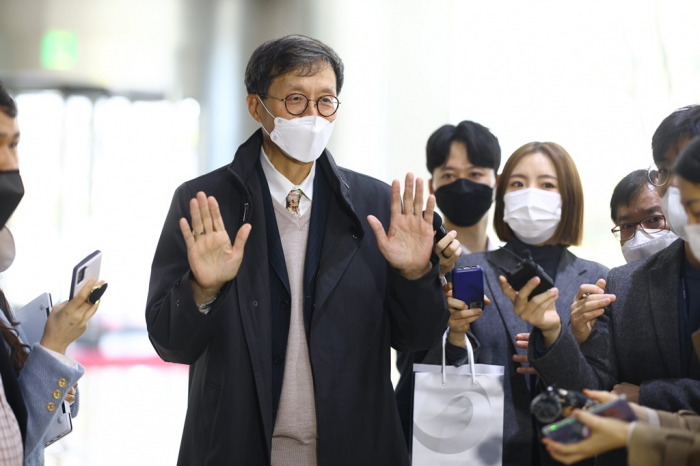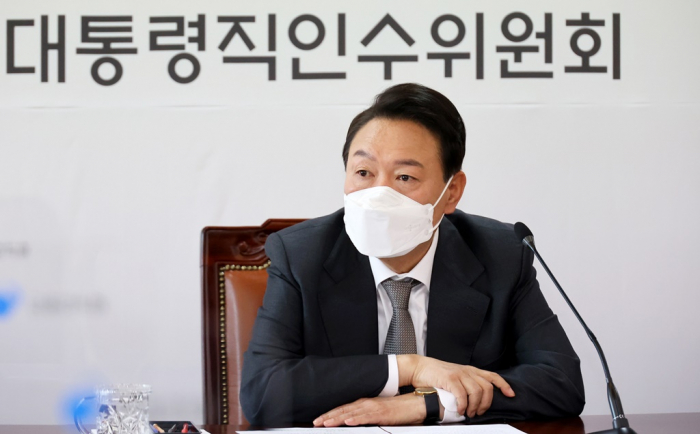Central bank
BOK chief nominee to curb household debt through interest rates
Rhee Chang-yong also says the BOK needs to cooperate with the government
By Apr 01, 2022 (Gmt+09:00)
3
Min read
Most Read
LG Chem to sell water filter business to Glenwood PE for $692 million


KT&G eyes overseas M&A after rejecting activist fund's offer


Mirae Asset to be named Korea Post’s core real estate fund operator


StockX in merger talks with Naver’s online reseller Kream


Meritz backs half of ex-manager’s $210 mn hedge fund



South Korea’s central bank chief nominee said on Friday he will use interest rates to tackle household debt in Asia’s fourth-largest economy, indicating further monetary policy tightening.
Rhee Chang-yong, a veteran International Monetary Fund official, said the country’s household debt is rapidly increasing and its quality is deteriorating, hurting the nation's economic fundamentals.
“The BOK should make policy efforts, such as sending signals and playing a role, to slow down the speed of growth in household debt, which is the fastest among Organisation for Economic Co-operation and Development member countries,” Rhee told reporters in Seoul.
Rhee also said he plans to cooperate with regulators such as the Financial Services Commission and the Financial Supervisory Service to stem household debt longer term.
The highly liquid three-year Korean government bond yield rose up to 8.6 basis points after the remarks that dampened expectations that the central bank may raise interest rates less than predicted once he takes office. Earlier this month, Rhee has said worries about both growth and inflation were increasing.
Rhee said on Friday that he could become either a hawk or a dove, depending on economic data and policy coordination with the government.
He is unlikely to chair the next rate-setting meeting on April 14 as lawmakers are set to hold a hearing to confirm his appointment. The former BOK Governor Lee Ju-yeol ended his term on March 31.
DEBT QUALITY COULD WORSEN
Household credits outstanding totaled an all-time high of 1,862.1 trillion won ($1.5 trillion) as of end-December 2021, up 134.1 trillion won from a year earlier, according to the BOK data. The annual increase was the largest since 2016 when the country relaxed lending regulations.
“Household debt often increases when (market) interest rates are lower than the equilibrium interest rate,” Rhee said, referring to a rate at which the demand of money exactly matches the supply.
The comment fanned expectations that the central bank will continue its policy of raising interest rates further. The BOK last month signaled two or three more hikes within this year.
“Household debt is burdensome in the mid-to-long term and it can bite into growth,” he stressed. “Its quality could deteriorate as retirees increase loans for living expenses amid sustained aging.” Old retirees with small incomes have relatively higher risk of insolvent loans.
COOPERATION WITH GOVERNMENT
Rhee emphasized the BOK needs to cooperate with the government on the monetary policy, while he will comprehensively consider the policy’s impact on inflation, growth, financial stability and the overall macroeconomy.
“Not communicating with the government doesn’t mean a central bank is independent,” he said. “Fiscal and monetary policies need to be coordinated by looking at how they affect the macroeconomy and efforts need to be made to maintain consistency of policies.”
That came as President-elect Yoon Suk-yeol is seeking extra spending to support small companies and the self-employed hit by COVID-19. The government is expected to issue deficit bonds to fund the budget, souring bond market sentiment.

WORRIES ABOUT WEAKER WON
Rhee said it is possible for US policy interest rates to exceed the BOK’s base interest rate, given the Federal Reserve’s aggressive tightening bias. But he downplayed concerns over capital outflows, given South Korea’s strong economic fundamentals.
Instead, he expressed worries about a weaker won currency since it could raise import prices.
“I am more concerned over the impact of the won’s weakness on inflation,” Rhee said.
He expected inflation in the first half to top the central bank’s forecast of 3.1% for this year, the highest since 2011, but said it was hard to predict the second half.
“We will focus on risk management as uncertainties remain high.”
Write to Ik-Hwan Kim at lovepen@hankyung.com
Jongwoo Cheon edited this article.
More to Read
-

-
 Central bankBOK governor nominee stokes slower rate hike expectations
Central bankBOK governor nominee stokes slower rate hike expectationsMar 25, 2022 (Gmt+09:00)
2 Min read -
 EconomyBOK sees inflation at 11-year high as oil tops $100 on Ukraine crisis
EconomyBOK sees inflation at 11-year high as oil tops $100 on Ukraine crisisFeb 24, 2022 (Gmt+09:00)
3 Min read -
 Banking & FinanceBOK restores interest rates to pre-pandemic level
Banking & FinanceBOK restores interest rates to pre-pandemic levelJan 14, 2022 (Gmt+09:00)
3 Min read
Comment 0
LOG IN


